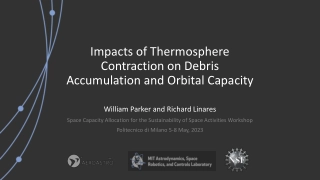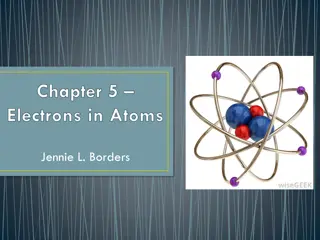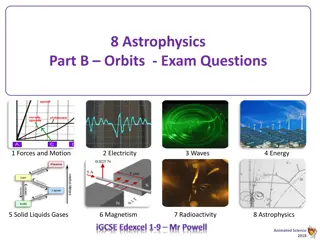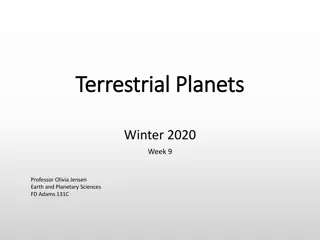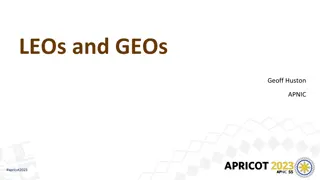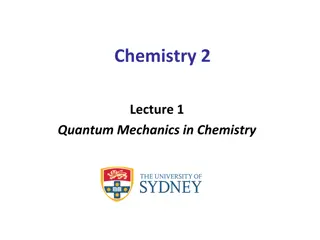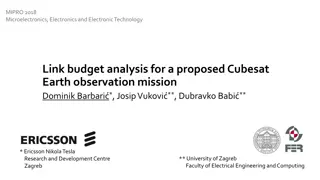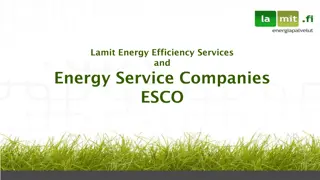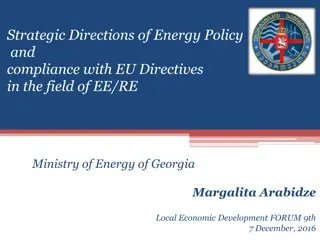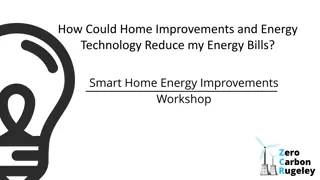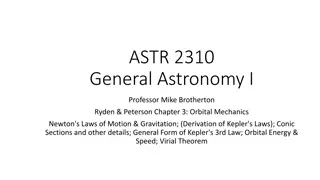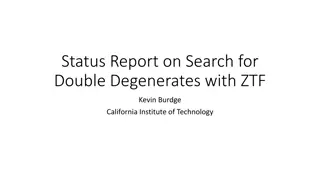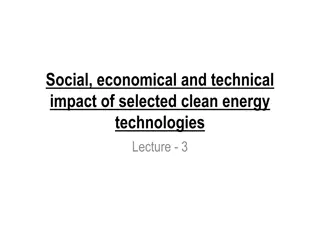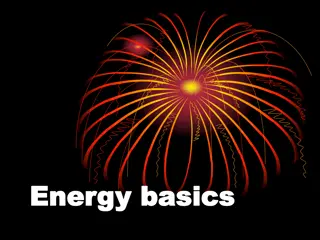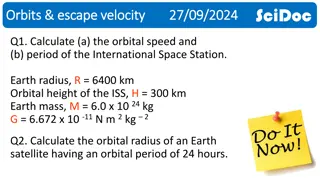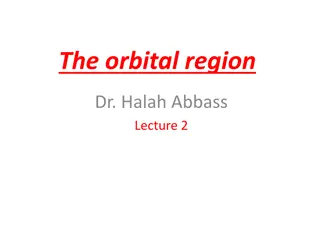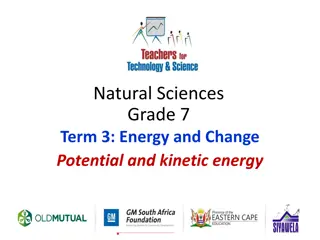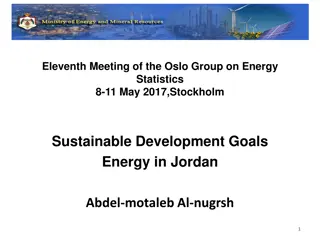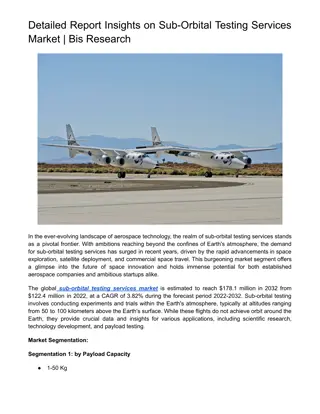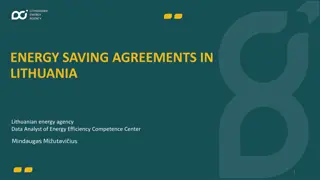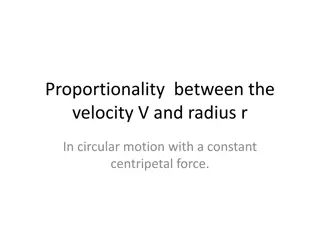Green Energy Market
Green energy also referred to as clean energy, is usually derived from natural sources that are constantly replenished. Solar energy, wind energy, hydroelectric power, biomass energy, geothermal energy, tidal energy, and wave energy are different types of renewable energy. Solar energy is the radian
6 views • 6 slides
Impacts of Thermosphere Contraction on Debris Accumulation and Orbital Capacity
Explore the effects of thermosphere contraction on debris accumulation and orbital capacity, as discussed in a workshop at Politecnico di Milano. Satellite observations reveal increasing COx levels, impacting the upper atmosphere's chemistry. The concern for space debris management is highlighted, e
1 views • 29 slides
Comprehensive Overview of Energy Balances in Germany
This material covers various aspects of energy balances in Germany, including components of energy flowcharts, renewable energy sources in the German energy balance, and total final consumption of road transport energy. It provides a detailed analysis of energy imports, domestic extraction, losses,
2 views • 10 slides
Influence of Solar Activity and Orbital Motion on Terrestrial Atmosphere
Solar magnetic field reversal, wavelet spectral analysis, and proxies for solar activity index are discussed in relation to the joint effects of solar activity and solar orbital motion on the Earth's atmosphere. The study highlights the impact of solar cycles on terrestrial climate dynamics and temp
6 views • 16 slides
Understanding Energy: Types, Potential, and Kinetic
Dive into the world of energy with a comprehensive guide covering the definition, types, and characteristics of gravitational, potential, and kinetic energy. Explore how energy is the driving force behind all work and movement, with examples and explanations provided for each energy type. Gain insig
2 views • 24 slides
Understanding Electrons in Atoms: Models and Quantum Mechanics
Explore the evolution of atom models from Rutherford to Bohr and the Quantum Mechanical Model. Learn about energy levels, electron movement, excitations, and orbital probabilities. Discover how electrons jump between energy levels and the limitations of Bohr's model in multi-electron atoms.
1 views • 51 slides
Sustainable Energy Initiatives at Local Level in Lithuania
The National Parliamentary Workshop on Energy Efficiency highlighted the importance of renewable energy development and sustainability at the local level in Lithuania. Initiatives such as the Breakthrough package and Renewable Energy Communities aim to improve energy efficiency, reduce energy povert
2 views • 12 slides
Understanding Orbits and Motion in Astrophysics
Explore the concept of orbits and motion in astrophysics, covering gravitational forces, planetary orbits, orbital speeds, and celestial phenomena like lunar eclipses. Delve into how objects move in space, the relationships between orbital speed, radius, and time period, and the dynamics of celestia
0 views • 14 slides
Chemistry Regents August 2022: Questions and Answers
Explore the answers to questions from the August 2022 Chemistry Regents exam, covering topics like electron configuration, orbital definition in the wave-mechanical model, and electron energy shells in atoms. Understand concepts such as the number of protons in an atom, orbital definitions, and elec
0 views • 167 slides
Exploring Energy Stores and Transfers in Science Lessons
Dive into the fascinating world of energy stores and transfers through engaging science lessons. Recall different energy stores, common energy transfers, and create flow diagrams to illustrate energy transfers in various scenarios. Explore gravitational, elastic, magnetic, electrostatic potential en
5 views • 9 slides
Understanding Crystal Field Theory in Chemistry
Crystal Field Theory (CFT) explains how electron orbital degeneracies, particularly d or f orbitals, are affected by a static electric field generated by neighboring anions. In CFT, the metal ion is considered positive while ligands are negative charges, leading to attractive and repulsive forces af
0 views • 13 slides
Energy Assistance Workshop Series Statewide Assessment
The Energy Assistance Workshop Series conducted a statewide assessment to understand energy burden and discuss utility energy assistance programs. The goal was to evaluate the effectiveness of mechanisms for energy assistance to prioritize households with higher energy burdens. The workshops aimed t
0 views • 26 slides
Understanding Energy Transformation in the Natural World
Energy transformation occurs continuously in various forms around us, following the Law of Conservation of Energy. From thermal to chemical and electromagnetic energy, different types of energy are converted and utilized in everyday processes. Examples include the conversion of thermal energy to ele
0 views • 27 slides
Understanding Energy - Forms, Calculations, and Applications
Explore the concept of energy through various images, including forms of energy, kinetic versus potential energy, and calculations involving kinetic and potential energy. Learn about identifying energy states, calculating kinetic energy, and solving physics problems related to energy transfer. Dive
0 views • 27 slides
Understanding Orbital Mechanics: Kepler's Laws, Center of Mass, and Equation of Motion
Exploring the fundamental concepts in orbital mechanics including Kepler's Laws, center of mass calculations, and equations of motion for celestial bodies. Topics covered include the laws of planetary motion, center of mass reference frame, and the concept of reduced mass in celestial mechanics.
0 views • 15 slides
Understanding Energy Transfers with Sankey Diagrams
Sankey diagrams are visual tools that depict energy transfers within a system, offering insights into efficiency and energy distribution. By examining the width of arrows representing energy flow, one can analyze useful and wasted energy outputs. Inefficient systems show a disproportionate amount of
1 views • 9 slides
Understanding Orbital Dynamics: Kepler's Laws and Newtonian Gravity
Delve into the fascinating world of orbital dynamics as we explore Kepler's Laws and Newtonian Gravity. From understanding the elliptical orbits of planets around the Sun to uncovering the role of gravity in shaping celestial motion, this journey will illuminate the fundamental principles governing
0 views • 18 slides
Understanding Orbital Altitudes and Satellite Services
Explore the fascinating realm of orbital altitudes and satellite services, including the differences between Low Earth Orbit (LEO) and Geostationary Earth Orbit (GEO). Learn about the physics behind satellite trajectories and how services like Starlink and Skymuster provide unique communication solu
0 views • 35 slides
Understanding Electron Configuration and Quantum Numbers in Chemistry
Explore the concept of electron configurations, quantum numbers, and orbital filling rules in chemistry. Discover the principles governing the arrangement of electrons in atoms, including the Aufbau Principle, Pauli Exclusion Principle, and Hund's Rule. Gain insight into orbital energy levels and th
0 views • 18 slides
Quantum Mechanics in Chemistry Lecture 1 Overview
Explore the fundamentals of quantum mechanics in chemistry, focusing on electron behavior, orbital solutions, bonding, and interactions. Learn about the role of different orbitals, resonance, and orbital mixing in the Schrödinger equation to understand molecular structure and behavior.
0 views • 24 slides
Conducting an Effective School Energy Audit
Performing an energy audit at a school helps in understanding energy usage patterns, identifying areas of waste, and creating energy-saving action plans. The audit involves collecting data, creating switch-off lists, and filling out templates methodically to track energy consumption. It should be do
0 views • 16 slides
Understanding Molecular Orbital Diagrams for Diatomic Molecules
Explore the intricacies of MO diagrams for diatomic molecules like O2, delving into electron configurations, bond orders, and orbital mixing effects. Discover how MO theory offers a more accurate depiction of molecular structures compared to traditional Lewis dot structures.
0 views • 12 slides
Understanding Different Forms of Energy and Work in Physics
Energy in physics is the capacity to do work, and there are various forms of energy such as radiant energy, kinetic energy, gravitational potential energy, elastic potential energy, chemical potential energy, nuclear potential energy, electrical potential energy, thermal energy, and sound energy. Ea
0 views • 47 slides
Link Budget Analysis for Cubesat Earth Observation Mission
This research paper discusses the link budget analysis for a proposed Cubesat Earth observation mission, covering aspects such as Cubesat dimensions, mission objectives, communication parameters, orbital mechanics, and current missions in various frequency bands. Key topics include mapping light pol
0 views • 24 slides
Understanding Energy Service Companies (ESCOs) and Their Role in Energy Efficiency
Energy Service Companies (ESCOs) like Lamit offer a range of energy services, from implementing energy-efficiency projects to renewable energy solutions. These companies work as long-term energy management partners, focusing on understanding customer needs, providing energy-saving solutions, and gua
2 views • 18 slides
Overview of Energy Policy and Compliance with EU Directives in Georgia
Ministry of Energy in Georgia focuses on strategic directions for energy policy in alignment with EU directives. The Energy Strategy, Covenant of Mayors, and National Energy Efficiency Action Plan are key initiatives promoting energy efficiency and renewable energy. Projects include consultancy on s
0 views • 10 slides
Exploring Home Energy Improvements and Smart Technology for Energy Efficiency
Discover how home improvements and energy technology can significantly reduce energy bills. Join the Smart Home Energy Improvements Workshop in Zero Carbon Rugeley to explore approaches for sustainable energy production and usage at home. Learn about retrofitting, smart energy systems, and meet char
0 views • 20 slides
Understanding Orbital Dynamics: From Newton's Laws to Kepler's Laws
Exploring the fascinating realm of orbital dynamics, this content delves into the application of Newton's laws to explain Kepler's laws and the intricacies of orbital mechanics. Deriving Kepler's laws from Newton's law of gravitation involves advanced mathematics, while also emphasizing the signific
0 views • 25 slides
Exploration of Double Degenerates in White Dwarf Binaries
The search for double degenerates in white dwarf binaries involves techniques like eclipses, ellipsoidal modulation, and irradiation of companions. Discoveries such as an orbital period of 20 minutes, orbital decay measurements, and technical challenges in data processing using GPUs are highlighted.
0 views • 14 slides
Social, Economical, and Technical Impact of Clean Energy Technologies
This course covers the management of micro-level clean energy projects, emphasizing the social, economic, and technical impacts of selected clean energy technologies. It discusses project organization, tools, project life cycle, financial analysis, barriers, capacity building, and more. It delves in
0 views • 32 slides
Understanding Energy Basics: Temperature, Heat, and Transfer
Explore the fundamental concepts of energy, including temperature, heat, and energy transfer. Learn how temperature differs from heat, how they are measured, and the relationship between thermal energy and water volume. Discover the role of chemical energy and sound energy, and how energy is transfo
0 views • 12 slides
Understanding Broadband Communication Systems and Satellite Communications
Broadband communication systems involve the use of satellites for various applications such as TV services, data services, and communication with ships and aircraft. This content delves into orbital mechanics, the gravitational forces in satellite orbits, as well as the orbital heights and velocitie
0 views • 57 slides
Orbital Mechanics and Satellites Overview
This content provides calculations for the orbital speed and period of the International Space Station, as well as the orbital radius of an Earth satellite with a 24-hour period. It explains the concept of artificial satellites, different types of orbits such as Low Earth Orbit (LEO), Medium Earth O
0 views • 17 slides
Understanding the Orbital Region: An Overview
The orbital region encompasses the orbits, eyelids, ciliary and tarsal glands, and anatomical borders. It consists of bony cavities protecting the eyeballs, eyelids that shield the eyes, and intricate structures like the lacrimal apparatus and muscles. Understanding the components and anatomical rel
0 views • 15 slides
Understanding Energy: Potential and Kinetic Forms in Grade 7 Natural Sciences
Energy in various forms is explored in Grade 7 Natural Sciences, with a focus on potential and kinetic energy. Energy is the ability to do work and exists in different types like heat, chemical, electromagnetic, nuclear, and mechanical. The sun serves as a primary energy source. Potential energy is
0 views • 11 slides
Energy Strategy and Challenges in Jordan: Towards Sustainable Development
The Eleventh Meeting of the Oslo Group on Energy Statistics discussed the energy sector in Jordan, highlighting challenges such as population growth, energy demand, and high energy costs. Jordan aims to diversify energy resources, reduce oil dependency, and enhance environmental protection through i
0 views • 34 slides
Europe Sub-Orbital Testing Services Market Forecast & Opportunities
The Europe sub-orbital testing services market is estimated to reach $30.7 million by 2032 from $16.4 million in 2022, at a CAGR of 6.48% during the forecast period 2022-2032.\n\nRead Report Overview: \/\/bisresearch.com\/industry-report\/europe-sub-
1 views • 3 slides
Sub-Orbital Testing Services Market
The global sub-orbital testing services market is estimated to reach $178.1 million in 2032 from $122.4 million in 2022, at a CAGR of 3.82% during the forecast period 2022-2032.\n\nRead Report Overview: \/\/bisresearch.com\/industry-report\/sub-orbit
1 views • 3 slides
Energy Saving Agreements in Lithuania: Legal Framework and Targets
Lithuania's energy saving agreements are guided by a comprehensive legal framework including laws on energy efficiency and methodologies for energy audits. The country has set ambitious energy efficiency targets for 2030, focusing on sectors like building renovation, industry, and household applianc
0 views • 14 slides
Understanding Orbital Motion and Circular Velocity in Physics
Explore the concept of orbital motion and circular velocity in physics, where we delve into the relationship between velocity and radius in circular motion with a constant centripetal force. Through Newton's 2nd Law and gravitational forces, we uncover the dependence of satellite speed on the radius
0 views • 13 slides

